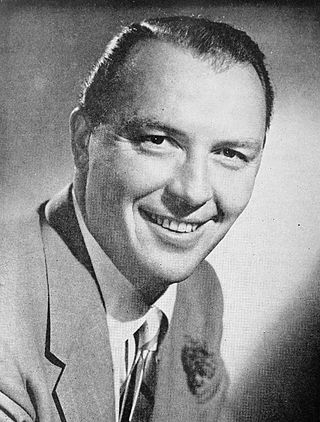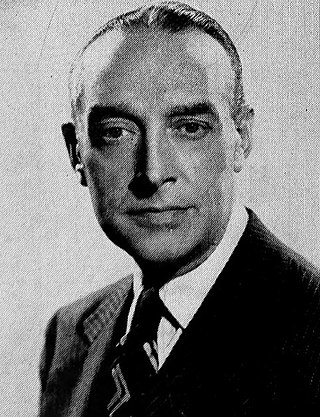Related Research Articles

Edward Joseph Herlihy was an American newsreel narrator for Universal-International. He was also a long-time radio and television announcer for NBC, hosting The Horn and Hardart Children's Hour in the 1940s and 1950, and was briefly interim announcer on The Tonight Show in 1962. He was also the voice of Kraft Foods radio and television commercials from the 1940s through the early 1980s. When he died in 1999, his obituary in The New York Times said he was "A Voice of Cheer and Cheese".
The American Album of Familiar Music is a radio program of popular music broadcast from October 11, 1931, to June 20, 1954, first on NBC, then on ABC and then on local stations. Directed by James Haupt, the show was produced by Frank and Anne Hummert, better remembered today for creating Ma Perkins and numerous other soap operas.

Backstage Wife is an American soap opera radio program that details the travails of Mary Noble, a girl from a small town in Iowa who came to New York seeking her future.

Anne Hummert was the leading creator of daytime radio serials or soap opera dramas during the 1930s and 1940s, responsible for more than three dozen series.
Just Plain Bill was a 1932-1955 15-minute American radio drama program heard on CBS Radio and NBC Radio. It was "a story of people just like people we all know."

Frank Gallop was an American radio and television personality.

Stella Dallas was an America radio soap opera that ran from October 25, 1937, to December 23, 1955. The New York Times described the title character as "the beautiful daughter of an impoverished farmhand who had married above her station in life." She was played for the entire run of the series by Anne Elstner. Her husband Stephen Dallas was portrayed at various times by Leo McCabe, Arthur Hughes and Frederick Tazere. Initially, Joy Hathaway played Stella's daughter Laurel with Vivian Smolen later taking over the role. Laurel's husband was Dick Grosvenor.

Young Widder Brown was a daytime radio drama series broadcast on NBC from 1938 to 1956. Sponsored by Sterling Drugs and Bayer Aspirin, it daily examined the life of "attractive Ellen Brown, with two fatherless children to support."

George Ansbro was a radio announcer for NBC and ABC for six decades, working with soap operas, big bands, quiz shows and other programs.

When a Girl Marries is an American daytime radio drama that was broadcast on three major radio networks from 1939 to 1957. Created by Elaine Sterne Carrington, it was the highest rated soap opera during the mid-1940s.

Lorenzo Jones was a daytime radio series which aired on NBC in different timeslots over an 18-year span.
Vernive Hill Blackett was a radio daytime-advertising pioneer who played a major part in the development of the soap opera.
Kitty Foyle is an American old-time radio and television soap opera originally aired during the 1940s and 1950s that was based on the 1940 film of the same name starring Ginger Rogers. Kitty Foyle was created by soap opera mogul Irna Phillips of Guiding Light fame and produced by daytime radio monarchs Frank and Anne Hummert of Helen Trent recognition. The program originally starred Julie Stevens in the title role of Kitty Foyle on radio. On television, the title role was portrayed by Kathleen Murray.
Edward Frank Hummert, Jr., professionally known as Frank Hummert and sometimes credited as E. Frank Hummert, was an American advertising agent originally but was best known for writing/producing episodes of nearly 100 daytime/primetime radio dramas and soap opera serials between the 1930s and the 1950s.
Betty and Bob is a radio soap opera. The soap opera follows the lives of Betty and Bob Drake. Betty was a secretary who falls madly in love with her boss, bachelor Bob Drake. The two wed and each day, the subject matter dealt with everything from love to hate, jealousy to divorce, murder to betrayal, and collusion to insanity.
The American Melody Hour was an American old-time radio program. The American Melody Hour was designed as a musical variety show. The program showcased a half-hour playing and singing "the tunes of yesterday and tomorrow..." mostly sung by baritone Bob Hannon.
The Carters of Elm Street is an American old-time radio soap opera. It was broadcast on NBC from February 13, 1939 to January 19, 1940 and on Mutual from January 22, 1940, to July 19, 1940

Front Page Farrell is an American old-time radio program that was broadcast on Mutual from June 23, 1941 to March 13, 1942, and on NBC from September 14, 1942, to March 26, 1954. The episodes broadcast on Mutual originated at WOR, making the program the first live serial that Mutual broadcast from New York City.
Mr. Chameleon is a detective fiction radio drama created by Frank Hummert and produced by Frank and Anne Hummert. It ran on CBS Radio from July 14, 1948, to 1951 or 1953. The series starred Karl Swenson as a New York police detective who is a master of disguise, and who assumes a new identity in each episode in order to catch a criminal. The listening audience is always aware of who Mr. Chameleon is, no matter in which disguise he appears. According to the series' opening voice-over, "Chameleon" is not a nickname or pseudonym but the character's actual surname, one which he has tried to live up to since childhood. His motto is, "The innocent must be protected and the guilty must be punished." The theme song is John Jacob Loeb and Paul Francis Webster's "Masquerade".
Chaplain Jim is an American radio war drama that began on April 20, 1942, and ended on June 30, 1946. It began on the Blue Network and later moved to the Mutual Broadcasting System.
References
- ↑ "Main Street" (PDF). Radio Daily. January 5, 1945. Archived from the original (PDF) on 2014-11-27. Retrieved 2 January 2015.
- ↑ "Another One" (PDF). Billboard. February 10, 1940. p. 7. Retrieved 24 August 2016.
- ↑ Dunning, John (1998). On the Air: The Encyclopedia of Old-Time Radio . Oxford University Press. pp. 23-24. ISBN 0-19-507678-8 . Retrieved 9 April 2020.
- ↑ Ansbro, George. I Have a Lady in the Balcony: Memoirs of a Broadcaster in Radio. McFarland, 2000.
- ↑ Goodwin, Danny. "Not-So-Famous Products Were Radio Sponsors"